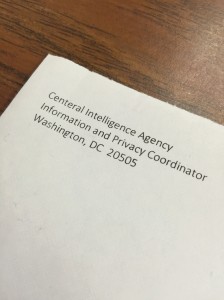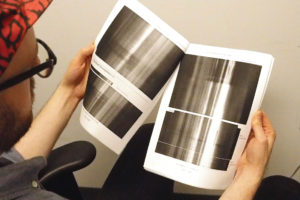
Special Prize for Drunk Dialing for Public Records: New Mexico Governor Susana Martinez
New Mexico media outlets have been battling against Gov. Susana Martinez’ stalling tactics with records requests basically since she was elected to office in 2010. Yet, when it comes to her own requests for public information, Martinez is a little impatient.
Last year, Martinez was partying in a room at a downtown Santa Fe hotel when the police responded to complaints of noise and bottles being tossed off the balcony. While still at the hotel, a furious Martinez called 9-1-1 and demanded to know the name of the person who filed the complaint. As the released dispatcher recording revealed, Martinez demanded, “It’s a public record. Give it to me.”
We’re a little sympathetic: The world would be a better place if we could all get public records on demand with a simple phone call. Unfortunately, that’s not the case yet, apparently not even for governors.
Martinez claims she had had only one cocktail, but witnesses told police she was visibly “inebriated.” She later claimed, “Nothing that I said or did was as a result of any alcohol.”
That’s almost worse, isn’t it?
Ministry of Silly Talks Award: UK Independent Commission on Freedom of Information
The United Kingdom also has a Freedom of Information Act, and last year a new body was formed to review the state of play (read: investigate whether transparency is too expensive and invasive). But at its first meeting in 2015, the Independent Commission on Freedom of Information announced a ludicrously ironic set of ground rules for reporters. As The Guardian reported, the meeting would be “off the record” and journalists could not quote anyone. Transcripts weren’t published either.
Head Trip Award: U.S. Army Surgeon General
The U.S. Army wasn’t happy with New York Times reporter Dave Philipps’ investigation into concussions at West Point. As documents show, Army officials came up with a plan to undercut his story by stalling the release of FOIA documents until the Army could publish its own report. What’s worse is that this wasn’t the first time they’d pulled this trick. As Army Surgeon General Lt. Gen. Patricia D. Horoho said, according to a meeting summary, “Timing is everything with this stuff. We were able to do something similar … when the Colorado Springs Gazette attacked them with treatment of wounded warriors last year –– killed any scrutiny from the media and killed their story.”
Copywrong Award: City of Inglewood
Local governments hate gadflies, those tenacious citizens who troll public meetings at every opportunity. The city of Inglewood in California thought it would use copyright law as a swatter, suing a local resident. Joseph Teixeira had been posting video clips from city council meetings (which are public records) to YouTube with his own DVD-Bonus-Feature-style commentary, accusing officials of lying and betraying their constituents. Teixeira won the case in federal court in August, proving that trying to use copyright law to silence critics is a waste of everyone’s time and tax dollars.
Gitmo, Get Less Award: Department of Defense
Miami Herald reporter Carol Rosenberg has been covering Guantanamo Bay for more than a decade, and that’s how long its taken the Department of Defense to release information on the costs of running the offshore detention facility for enemy combatants in the “War on Terror.” In 2004, a DOD official started compiling answers to her questions but later informed her he was under orders not to release the information. Rosenberg filed a formal FOIA request in February 2005, received a rejection, and then appealed. In 2015, almost 4,000 days later, she received an apology for the delay and a decision that the secrecy was unwarranted. She received three pages of information that showed the tens of millions spent to maintain the controversial facility in its first years.
Correction Fluid Award: Willacy County Sheriff, Texas
The Houston Chronicle was researching a reported spike in crime along the Mexican border by filing Open Records Act requests for crime data with sheriffs across south Texas. None of the sheriffs asked the Chronicle to pay records fees, except for one. The Willacy County Sheriff provided Brian M. Rosenthal with an itemized invoice for $339.60 that included — wait for it — $98.40 worth of Wite-Out. Based on Staples pricing, that’s a full 55 bottles worth of redaction or one bottle of Wite-Out per 18 pages of responsive documents.
Spellcheck Shmellcheck Award: Central Intelligence Agency
These FOIA response envelopes received by MuckRock (mis)speak for themselves:

Beasts of Privacy Award: Oregon State Legislature
This year, we received three separate nominations in which FOIA officials were absurdly mindful of the privacy of animals. Reporter Elizabeth Dinan found on at least two occasions that the Portsmouth Police Department in New Hampshire was redacting the names of lost and loose dogs from its blotters. Meanwhile, MuckRock contributor Carly Sitrin found that New Jersey initially refused to release the necropsy results for a dolphin that died in the South River, citing the dolphin’s “medical privacy.” N.J. later reversed course.
The prize, though, goes to the Oregon State Legislature, which renewed a law exempting the names of people who sell laboratory animals to Oregon Health & Sciences University, ostensibly to protect vendors from overzealous animal rights activists. InvestigateWest reporter Lee Van Der Voo obtained records (released seemingly by accident by the Oregon Department of Agriculture) that illustrated the pitfalls of shielding an industry from scrutiny. As it turns out, one of the primary primate dealers to the university had previously served time for illegally smuggling orangutans as part of the infamous “Bangkok Six” case.
Sue the Messenger Award: Sacramento Mayor Kevin Johnson
The Sacramento News & Review filed a public records request with the city of Sacramento for communications from Mayor Kevin Johnson’s office regarding how the former basketball star and his staff allegedly engineered the collapse of the National Conference of Black Mayors. The City Attorney agreed the e-mails were public, but then Johnson’s legal team threatened to file a lawsuit against SNR unless they abandoned their quest for transparency. SNR refused, Johnson sued, and now the story has been stalled as the case plays out through a protracted legal process. It remains to be seen whether the case will wrap up before Johnson leaves office next year.

The Culture of Secrecy Award: Kentucky Cabinet for Health and Family Services
In 2010 and 2011, the Courier-Journal and the Lexington Herald-Leader filed Open Records Act requests with the Kentucky Cabinet for Health and Family Services for information related to child fatalities. The agency balked at providing many of the records, forcing the newspapers to sue.
A lower level court ruled in the newspapers’ favor and ordered the agency to pay $1 million in penalties and fees. Rather than let it go at that, the cabinet appealed, only to dig itself deeper into the hole. After the oral argument in October 2015, the appeals court sided with the media and issued this juicy condemnation:
“The Cabinet’s conduct in this case was indeed egregious. The face of the record reveals the ‘culture of secrecy’ of which the trial court spoke; and it evinces an obvious and misguided belief that the Open Records Act is merely an ideal — a suggestion to be taken when it is convenient and flagrantly disregarded when it is not.”
The Most “Helpful” Redactions Award: Office of Director of National Intelligence
Redactions are a way of life in FOIA, but a response received by the American Civil Liberties Union from the Office of the Director of National Intelligence (ODNI) in September takes this year’s award for most ridiculous misuse of the black marks.
For years, the ACLU has been demanding access to records documenting the government’s “targeted killing” program. In ODNI’s response to ACLU, it claimed to be releasing an eight-page letter that ODNI Director James Clapper sent to ranking senators on the Intelligence Committee. That statement was belied by the fact that ODNI withheld nearly every word of the letter, save for the page numbers, names and addresses of the senators it was sent to, and a final concluding paragraph from Clapper. The redactions are so all-encompassing, there is no way to know what the subject of the letter is and whether it actually discusses the targeted killing program.
The kicker? The un-redacted paragraph at the end of the letter begins “We hope this information has been helpful.”
Yeah, real helpful. Keep up the FOIA trolling, ODNI.
Exhibit Inhibition Award: Department of Justice
The Department of Justice believes that exhibits it used in open court when prosecuting a doctor convicted of illegally distributing prescription drugs are not, in fact, public records. The DOJ staked out this curious position in a long-running FOIA dispute with Rhode Island-based reporter Phil Eil after he filed a request for copies of the exhibits prosecutors used during the 2011 trial of the doctor, Paul Volkman. After stalling for several years and requiring Eil to sue for the records, the DOJ proposed to release the records in heavily redacted form.
Of course, anyone who attended the trial would have been able to see the records without the DOJ’s redactions, which the DOJ claims were in part necessary to protect law enforcement concerns, despite airing those records in open court.
The Still-Interested Pat Down Award: Transportation Security Administration
Like the airport security line on a busy travel day, the TSA’s backlog of FOIA responses just seems to keep growing. That’s according to a compliance review by the Office of Government Information Services (OGIS), one in a series of reports on various agency-components of the Department of Homeland Security (DHS). OGIS found a nearly 70 percent year-over-year rise in the backlog of unfilled requests — up to 924 in 2014 — despite a small drop in the number of incoming requests.
How does TSA get through those old requests? Unfortunately, it turned to the dreaded “still-interested letter,” checking to see if requesters still care enough to want an answer. TSA sends those out after a case has gone unclosed for four years — and, contrary to DOJ guidance, allows only 10 days for requesters to respond. A bright spot in this sad story: Since OGIS compiled its report, TSA has updated its procedures on still-interested letters to bring them into line with DOJ and the rest of DHS.

Dave Maass
The Timey-Wimey Award: City of Wilmington, Delaware
In October, Wilmington Mayor Dennis Williams had to clarify that he had not endorsed Secretary Hillary Clinton for president after the campaign had listed his name on her website. The next day, America Rising, a conservative opposition research organization, filed a records request that asked for all communications to and from the mayor’s public relations team for that single, tumultuous day.
Here’s where the timeline gets bizarre: America Rising filed the request on October 21, asking for communications that were exchanged on October 20. Instead, the city said that America Rising had demanded the request be fulfilled by October 20, one day before the request was actually filed. The city denied the request, essentially claiming they lacked the time travel capabilities to respond. Since then, America Rising has clarified its request twice, and it’s still pending.
The Electronic Frontier Foundation is a nonprofit organization that defends free speech, privacy, innovation, and transparency in the digital world. The Foilies were compiled by Dave Maass, Aaron Mackey, and Parker Higgins of EFF, with assistance from Michael Morisy and JPat Brown of MuckRock News.











